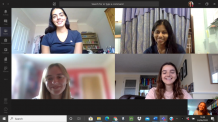Articles

The University’s unique annual Grand Challenges programme moved online for 2020 in response to the Covid-19 pandemic
Students develop innovative ideas to help tackle the world’s greatest problems during Grand Challenges week
From new technology to end loneliness to children’s books and food labelling to tackle the climate emergency – University of Exeter students have developed innovative solutions to the world’s greatest problems.
Students worked together in teams to tackle the major challenges of our time, working with academics and external experts.
The University’s unique annual Grand Challenges programme – which moved online for 2020 in response to the Covid-19 pandemic – saw more than 550 students signed up to investigate either the climate emergency, fighting fake news, loneliness and mental health and threats to food security.
They were joined by students from the University of South Florida and University of Mannheim. Teams worked on their projects in small groups for four days, supported by mentors, external speakers and a variety of skills workshops. Their work was showcased during an online event at the end of the week.
Simon Pardoe, Programme Officer for Grand Challenges, said: “It was fantastic that the Grand Challenges programme translated so well to the online format. I was impressed by the way that the students adapted to collaborative online working, especially as we had participants from 16 different time zones.”
Anka Djordevic, Programme Manager for Grand Challenges, said: “We were surprised how quickly and easily students got on with working remotely in a collaborative fashion. We had 65 groups working in parallel developing their original ideas into projects with potential to be implemented in the real world. Students with different skills sets and experiences can learn a lot while working in a truly interdisciplinary manner. No matter what their individual background, culture and language are, they share similar passions and they want to help.”
Groups examining how to tackle fake news, including misconceptions about the Black Lives Matter movement in the media, came up with ideas including changes to the school curriculum and a new reporting function and icon on social media. Teams also developed a podcast to debunk myths, educate people and amplify other voices and a new social media platform where children could challenge misinformation and a new fact-checking app to help the public identify fake news. The winning idea was a Black Lives Matter action day at the University of Exeter to educate people on the struggles faced by black students. This would include black public speakers and lessons on the black experience. Resources on the Black Lives Matters movement and racism would also be available at all times as a resource for students to become better allies.
Groups examining how to tackle loneliness and mental health issues came up with the ideas including a new “virtual family” app to help students when they arrived at university so they can access support and wellbeing services. The winning idea was “Frendli”, a new virtual community and podcast and an app which helps connect students with similar interest and find support and resources. The online hub would allow students to volunteer to support their peers, and would include motivational content and resources to support wellbeing. Users would be able to find new friends or get in touch with a professional.
Groups working on how to tackle the climate emergency came up with ideas including electronic advertising boards to spread the word, an app and social media campaign to track recycling on the University of Exeter’s campus, and labels on food showing its carbon footprint. Other ideas include a podcast, an app to track mosquito-borne diseases, a website to debunk climate myths and using the water in the River Exe to heat the University of Exeter campus. The winning idea was interactive climate storybooks for children to educate them about environment. The books would include a character who guides the child through decision-making, so show them what their choices mean for the environment.
Groups working on how to tackle food insecurity came up with ideas including an app to help farmers become more resilient to climate change, a podcast to debunk myths, a cookbook and app to help students eat more sustainably and labels on food showing how sustainable it is. The winning idea was new technology to help farmers in Africa better store grain to cut down on food waste and reduce food poverty, inspired by centuries old local farming methods. The underground sealed space would be plastic-lined.
University of Exeter and Met Office climate expert Professor Peter Cox, who worked with teams, said: “Students brilliantly tackled the grand challenges of our time on a local and national scale. They have come up with a great range of creative, innovative solutions while working with new friends across the world and having fun.”
Professor Tim Quine, Deputy Vice Chancellor (Education) said: “The Grand Challenges programme epitomises what universities are all about: learning together, creating new knowledge, making discoveries, changing the way we think and sharing these insights in order to make the world a better place. Challenges online has demonstrated another integral characteristic- the ability of our learning community to adapt, innovate and pursue problem-solving whatever the conditions. The topics examined by students are especially pertinent now including fake news, social inequality and racial discrimination. It is clear from the great range of creative, innovative explorations of these pressing issues that students have been inspired to think deeply and creatively, and recognised their ability to create change.”
Find out more on the Challenges Online website and follow the projects via #challengesonline on social media. You can also watch a recording of the Grand Finale.
Date: 3 July 2020
